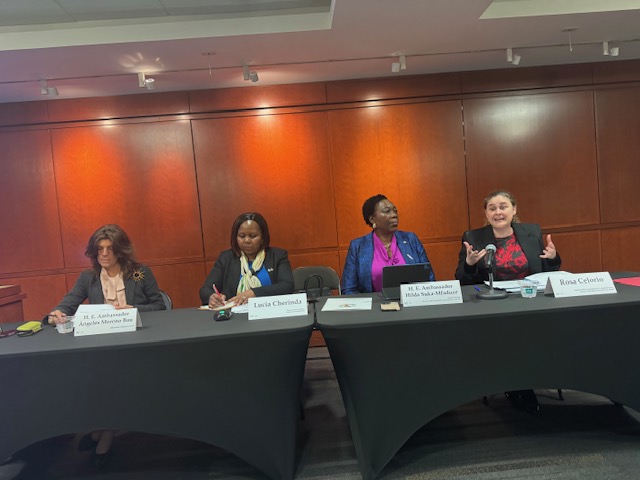This International Women’s Day, George Washington University Law School, in partnership with the Embassies of the African Union, Spain, and Denmark, and other collaborators from the region like ARPA International Law Group held a discussion surrounding women, law, and development in Africa. Discussants along with Ambassadors Hilda Suka-Mfaduze, Mathilde Mukantabana, and Ángeles Moreno Bau were able to highlight the actions of their countries to further women’s rights and UNA NCA’s Board member and Human Rights Committee Chair, Leila Hanafi, moderated the session.
 The African continent has demonstrated steady commitment to promoting gender equality and the empowerment of women, over the last two decades. Almost all countries have ratified the Convention on the Elimination of All Forms of Discrimination against Women; more than two thirds have ratified the African Union’s Protocol to the African Charter on Human and Peoples' Rights on the Rights of Women in Africa, also known as (Maputo Protocol), landmarks towards gender equality across Africa, promising equality and non-discrimination to women and girls in civil, political, economic, social and cultural rights. The panelists noted how, the Maputo Protocol, in particular, is widely regarded as a comprehensive, progressive and innovative legal instrument to inform countries’ legal, policy and institutional reforms that align with the commitments made. Significant strides have been taken in areas such as economic and social welfare rights, the right to participate in the political and decision-making process, marriage rights, reproductive health and protection against female genital mutilation (FGM).
The African continent has demonstrated steady commitment to promoting gender equality and the empowerment of women, over the last two decades. Almost all countries have ratified the Convention on the Elimination of All Forms of Discrimination against Women; more than two thirds have ratified the African Union’s Protocol to the African Charter on Human and Peoples' Rights on the Rights of Women in Africa, also known as (Maputo Protocol), landmarks towards gender equality across Africa, promising equality and non-discrimination to women and girls in civil, political, economic, social and cultural rights. The panelists noted how, the Maputo Protocol, in particular, is widely regarded as a comprehensive, progressive and innovative legal instrument to inform countries’ legal, policy and institutional reforms that align with the commitments made. Significant strides have been taken in areas such as economic and social welfare rights, the right to participate in the political and decision-making process, marriage rights, reproductive health and protection against female genital mutilation (FGM). Sylvie Bissaloue, a Human Rights Attorney from Benin, demonstrated the progress of gender equality in her country through a traumatic story of a young girl being raped by a neighbor. She shared how a story like that used to end with the family of the rapist praying for forgiveness from the girl’s family, but instead today leads to the rapist serving 30 years in prison. Not only has there been legal changes in Benin to further women’s rights, but Sylvie shared actions the government has taken to ensure access to education for women, including free tuition for girls. Jacob Sule, Founder of iRead to Live Initiative in Nigeria, built on Sylvie’s heartfelt remarks by explaining that the inspiration for his women empowerment organization came from the idea that every girl deserves a seat at the table. He said that if you asked a boy on the street in Nigeria about his dreams he would talk about becoming the next president. If you ask a girl, they would ask for money to start a business. Jacob emphasized how girls deserve to share those dreams of being the next president.
 Empowering women and girls to pursue their dreams was a common theme of the night. Access to education was identified as a key role in empowering women and creating reform. Julia Vaillant’s team from the World Bank’s Africa Gender Innovation Lab works to discover policies to close the gender gap. She highlighted how gender gaps in secondary education have not been solved and outlined community level interventions to keep girls in school, including creating safe spaces, scholarships, and mentorship programs. The new Women, Business, and the Law Report of 2024 was also presented at the event. It showed that the legal gender gap is wider than previously thought and closing the gender gap can raise GDP by 20%, creating an economy more sustainable to shocks.
Empowering women and girls to pursue their dreams was a common theme of the night. Access to education was identified as a key role in empowering women and creating reform. Julia Vaillant’s team from the World Bank’s Africa Gender Innovation Lab works to discover policies to close the gender gap. She highlighted how gender gaps in secondary education have not been solved and outlined community level interventions to keep girls in school, including creating safe spaces, scholarships, and mentorship programs. The new Women, Business, and the Law Report of 2024 was also presented at the event. It showed that the legal gender gap is wider than previously thought and closing the gender gap can raise GDP by 20%, creating an economy more sustainable to shocks.Ambassadors were also able to shine a light on obstacles their governments have faced while creating policies to further women’s rights. Ambassador Moreno Bau from Spain discussed the President’s worry over conservative reactions to the feminist policy he launched three years ago and how leadership commitment to address sensitivities is key to allyship on women’s rights matters. Deputy Chief of Mission Lucia Cherinda from Mozambique touched on the balance between men and women and the importance of remembering to prepare men when we are empowering women. Despite these obstacles, their governments remain conscious and are actively trying to increase women government participation. The discussion concluded on an artistic note with POLO Women Powered Stories and its founder, Miguel San Joaquin, a film producer who amplifies socio-economic transformative stories about inspiring women.in developing countries and who emphasized the important of gender allyship in advancing social transformation in communities.








